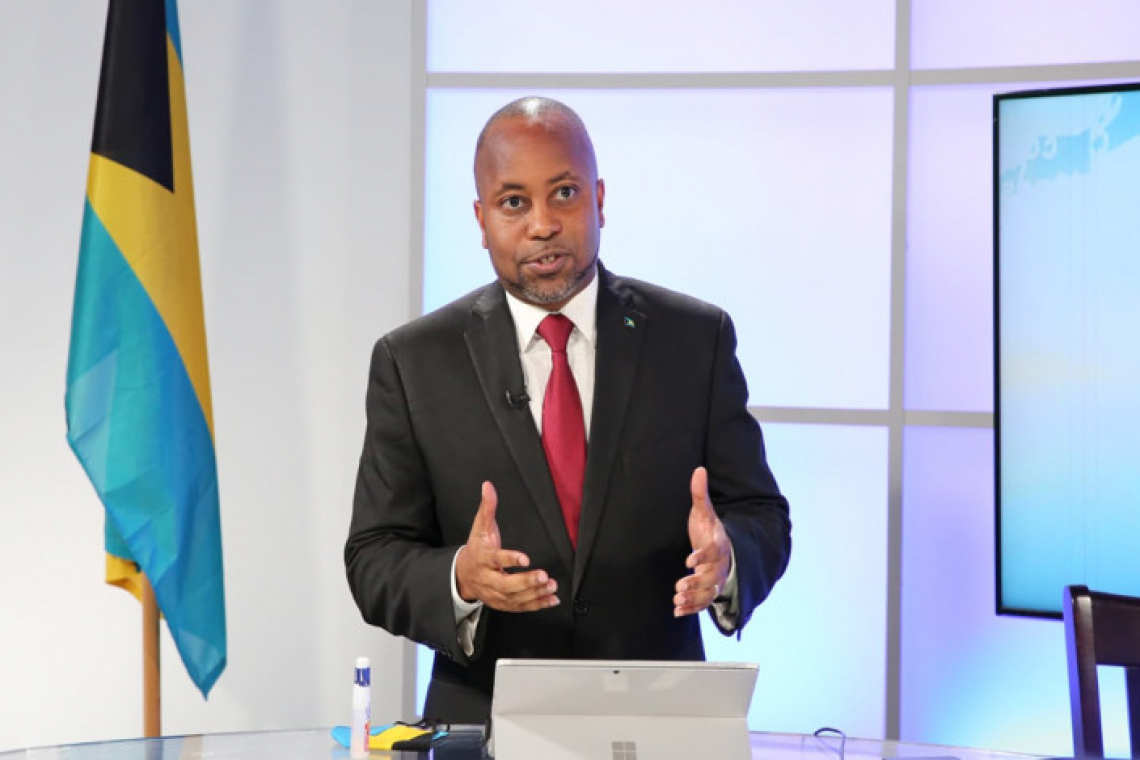Travis Cartwright-Carroll. Photo credit Kwasi Thompson, Bahamas Information Service (BIS).
NASSAU, The Bahamas--The far-reaching economic cost arising from the COVID-19 pandemic and the “extraordinary increases” in expenditure to support social assistance programmes have led to a continued widening of the fiscal deficit to US $878.2 million in the first nine months of the current fiscal year, up from $251.3 million during the same period in the year prior, the Ministry of Finance reported on Wednesday.
Total revenue from July 2020 to March 2021 declined by an estimated $527.4 million (30 per cent) to $1.2 billion, the ministry’s Combined Nine Month Fiscal Snapshot and Report on Budgetary Performance also showed.
Aggregate expenditure increased by $99.5 million (five per cent) to $2.1 billion and was boosted by significant increases in social assistance benefits ($145 million), finance charges, public debt interest and subsidies.
Recurrent expenditure increased by $129.6 million to $1.9 billion during the nine months to March, compared to the same period in the prior year.
Capital expenditure decreased by 15.2 per cent to $168 million.
Since July 2020, the government borrowed $2.3 billion, compared to the $936.6 million during the same period in the previous fiscal year, the snapshot shows.
The Bahamas recorded its first case of COVID-19 in March 2020 and the government swiftly moved to curtail social gatherings, ordered the closure of non-essential businesses, closed the country’s borders and implemented stay-at-home orders. The move shut down a large portion of the economy for months.
Taxes
Constraints imposed due to the COVID-19 pandemic and the accompanying safety measures on businesses triggered a decline in commercial activity, the ministry noted, pointing to a 36.4 per cent decline in value-added tax (VAT) of $268.9 million to $469.8 million.
“However, with the gradual improvement in economic conditions, VAT receipts strengthened to $183.4 million in the third quarter, from $151.7 million in the second quarter and $134.7 million in the opening quarter of [fiscal year 2020-2021 –
Ed.] FY2020/21,” the ministry said.
“The improvement in VAT collections was also aided by the expiration of certain clauses of the Special Economic [Recovery] Zone (SERZ) concessions designed to aid in the rebuilding of areas of Grand Bahama and Abaco damaged by Hurricane Dorian in September 2019.”
Stamp taxes on financial and real estate transactions declined by $4.3 million to $41.7 million.
“Taxes on specific services (gaming taxes) contracted by $14.4 million (46.7 per cent) to $16.4 million,” the ministry said.
“The patrons winnings tax implemented January 1, 2021, has not resulted in any incremental revenue from these activities, due to an ongoing legal challenge by the association of gaming house operators in respect to the application of the tax.”
Taxes on motor vehicles increased by $2.8 million to $23.8 million, “owing to the reopening of certain offices closed since the onset of the COVID-19 pandemic.”
Taxes on international trade and transactions decreased by $123.2 million to $163 million. The ministry said a major contributor to this was the decline in departure taxes by $103.6 million to $5.9 million, due to the slow recovery of the tourism sector.
Revenue from customs and other import duties also declined by $60.4 million to $134.2 million compared to year-earlier receipts.
General stamp taxes declined by $4.3 million to $1.6 million.
Property income receipts declined by $2.1 million to $19 million; revenue from the sale of goods and services contracted by $14.1 million to $111.8 million.
The ministry said the decline was due to the “reductions in immigration and customs fees.”
Fines, penalties and forfeit payments increased by 19.6 per cent to $3.6 million.
COVID assistance
The ministry said an estimated $194.9 million was spent on various programmes and initiatives to assist families and businesses affected by the COVID-19 pandemic.
In all, $15.5 million was spent on public health safety; $108 million on unemployment assistance; $2.2 million on goods and services acquisition; $23 million on a job retention programme; $30.8 million on food assistance; $14.3 million in small business loans; $500,000 on the COVID-19 Unit; another $100,000 on goods and services acquisition; and $500,000 on other expenses.
Path of recovery
Despite the dismal figures, the ministry said the third quarter fiscal results showed that the Bahamas is steadily progressing along a “path of recovery”.
“Although we have not achieved pre-pandemic levels, the third quarter results clearly indicate the situation is improving and we have successfully prevented any worse case economic scenarios from materialising,” Minister of State for Finance Kwasi Thompson said in a statement.
“Outside of the necessary increases in social welfare spending to maintain unemployment benefits and to provide food to those in need, we have managed to contain other discretionary expenses to offset these increases.
“This is what we set out to do as part of our fiscal adjustment plan: curtail non-essential capital expenditure by $100 million. So far, we have had notable success and we feel confident we will meet our fiscal target.” ~ The Nassau Guardian ~







